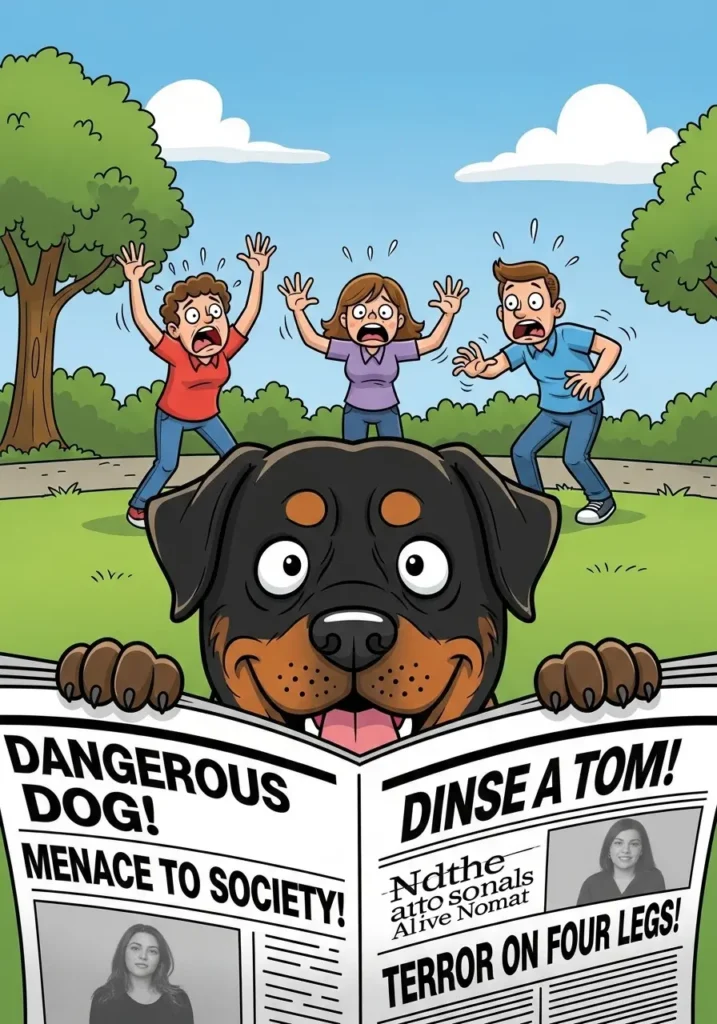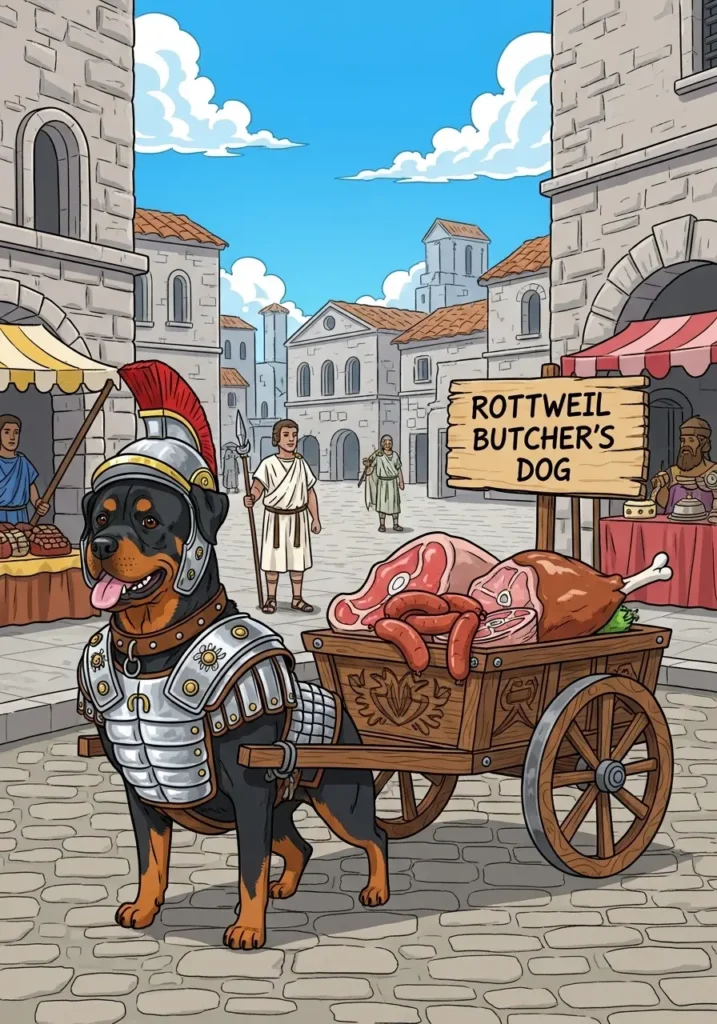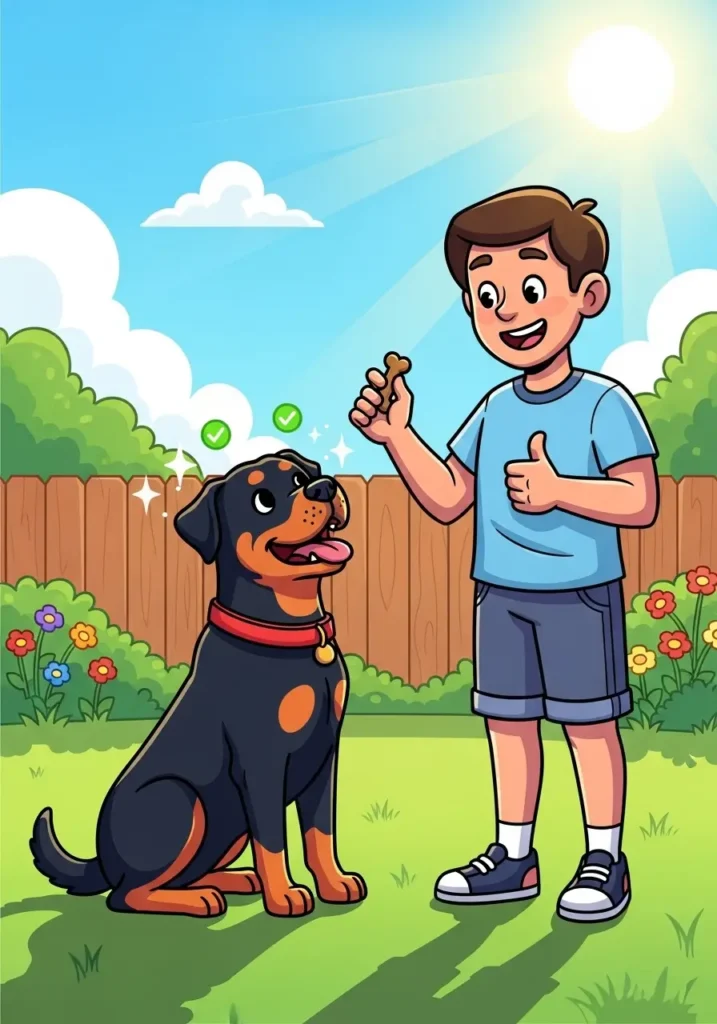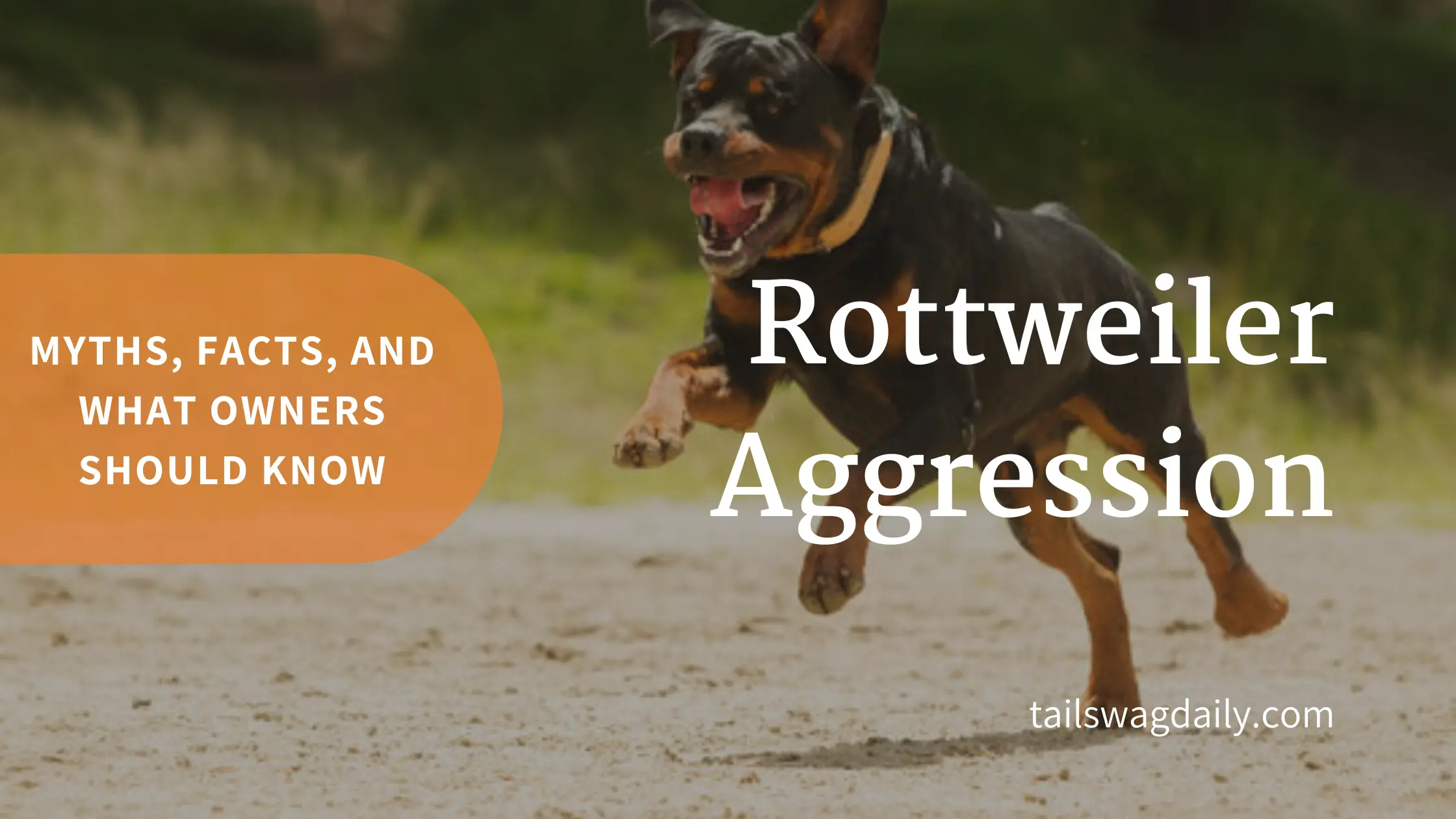You’ve probably heard it before “Be careful, that’s a Rottweiler!” People tense up, cross the street, or clutch their small dogs like you’re walking a mini T-Rex.
But here’s the thing: Rottweilers aren’t the villains Hollywood or gossip make them out to be. They’re loyal, goofy, and yeah protective, but “inherently aggressive”? Not even close.
Let’s set the record straight once and for all. If you’re a Rottie parent (or thinking of becoming one), this one’s for you. 🙂
The Reputation Problem: Why Rottweilers Get a Bad Rap

Somewhere along the way, Rottweilers joined the “dangerous dog” club alongside Pit Bulls and Dobermans. The media loves a scary headline, and unfortunately, a few isolated incidents painted an entire breed with the same brush.
But here’s what’s often ignored:
- Breed popularity affects statistics. The more Rottweilers there are, the higher the number of reported bites pure math, not proof of aggression.
- Identification errors happen. People mistake big, block-headed dogs for Rottweilers all the time.
- News bias sells. A Chihuahua bite won’t make it past local Facebook drama, but a Rottweiler nip? Hello, national headlines.
So before judging the breed, ask yourself: are we seeing the truth or just good storytelling?
What Rottweilers Were Actually Bred For

Let’s rewind to ancient Rome (yep, these dogs go way back). Rottweilers were bred to herd cattle and guard property, not to terrorize the neighborhood. They were strong enough to move livestock and brave enough to defend them from thieves and predators.
Later, in the German town of Rottweil, they worked as butcher’s dogs, pulling carts loaded with meat. That’s right your Rottie’s ancestors were the original delivery crew. If Uber Eats existed back then, they’d be wearing the orange jacket.
This working background explains a lot about their personality:
- Protective instincts – They’re wired to guard, not attack.
- High energy – They need physical and mental stimulation to stay happy.
- Strong loyalty – Once they bond with you, good luck getting them off your lap.
So, are Rottweilers tough? Absolutely. But aggression isn’t in their DNA responsibility is.
Aggression vs. Reactivity: There’s a Big Difference
Here’s where people get confused. They see a Rottweiler barking at another dog and assume it’s aggression. But what they’re actually seeing is reactivity a fancy word for “I’m excited and don’t know how to deal with this emotion.”
Reactivity ≠ Aggression
Reactivity can look like:
- Barking or lunging when on a leash
- Growling when a stranger enters the home
- Over-the-top excitement during play
But true aggression is driven by intent to harm, not curiosity or fear. Most Rottweilers bark because they’re alert, not angry. Ever had someone surprise you from behind? You probably jumped and yelled too. Same thing.
The key difference lies in body language:
- A reactive dog might bark with loose posture and wagging tail.
- An aggressive dog stiffens, growls low, and stares hard.
Knowing the difference can save you and your dog a lot of unnecessary stress.
What Actually Causes Aggression (Hint: It’s Not Breed Alone)
Aggression can show up in any dog, from a 150-pound Rottie to a 5-pound Chihuahua with anger issues. It’s a behavioral symptom, not a personality trait. The usual culprits?
1. Lack of Socialization
Dogs need early exposure to different sights, sounds, people, and animals. Without it, unfamiliar things can trigger fear and fear can lead to defensive behavior.
2. Poor Training
Using harsh punishment or inconsistent rules confuses dogs. A Rottweiler thrives on structure, so positive reinforcement (treats, praise, patience) works best.
3. Medical Problems
Pain changes behavior. A normally sweet dog might growl or snap if something hurts. Always rule out health issues before labeling your dog as “aggressive.”
4. Stress and Anxiety
Loud noises, chaotic homes, or being left alone for too long can mess with their emotional stability. A stressed dog isn’t bad they’re just communicating.
So yeah, genetics play a role, but environment and training matter way more. You wouldn’t blame a teenager’s attitude solely on their DNA, right? Same principle.
At What Age Do Rottweilers Become Aggressive? (Plus How to Calm Them)
The Media’s Favorite Scapegoat: Dog Bite Statistics
Here’s something fun (and frustrating): statistics can say whatever someone wants them to say. When you see headlines like “Rottweilers Top the List for Dog Bites,” remember the fine print.
Most studies fail to consider:
- Breed population – More dogs = more bites reported.
- Severity bias – Big dogs cause visible injuries, while smaller bites go unreported.
- Misidentification – A “Rottweiler-type” dog might actually be a mixed breed.
FYI, the American Veterinary Medical Association (AVMA) agrees breed isn’t a reliable predictor of aggression. So can we stop blaming the Rottweiler already?
Training Tips to Prevent Aggression (and Raise a Well-Behaved Rottie)

Training a Rottweiler isn’t about dominance or “being the alpha.” It’s about trust, patience, and consistency. You’re not trying to control your dog you’re teaching them how to live peacefully in your world.
1. Start Young
Early obedience training and socialization make a world of difference. Let your pup meet new people, hear strange noises, and explore safely.
2. Stay Positive
Punishment-based methods create fear, not respect. Reward the good stuff instead. Treats, toys, or a happy “Good job, buddy!” go a long way.
3. Use Mental Stimulation
Boredom = trouble. Use puzzle toys, scent games, or basic obedience refreshers to keep your Rottweiler’s brain busy.
4. Set Boundaries
Don’t let your dog become your landlord. Clear, consistent boundaries help them feel secure. Remember, leadership isn’t about control it’s about guidance.
5. Ask for Help
If things feel overwhelming, hire a certified force-free trainer. Seriously, it’s worth every penny. They’ll teach you techniques that strengthen your bond instead of damaging it.
How to Handle a Reactive or Aggressive Rottweiler
Let’s be honest it can feel scary when your dog growls or lunges. But here’s what not to do: panic or punish. That just fuels the fire.
Try This Instead:
- Create space from the trigger (walk the other way, cross the street).
- Stay calm. Dogs feed off your energy. If you act tense, they will too.
- Reward calm behavior. The moment your dog relaxes or looks at you, praise them.
- Use management tools. Muzzles, head halters, or “Give me space” vests can help prevent bad situations.
Remember: management isn’t failure it’s smart ownership. It gives you time to train safely and protect everyone involved.
Why Rottweilers Deserve a Better Reputation
Let’s get real for a second. Rottweilers are incredible dogs. They’re smart, sensitive, and deeply bonded to their families. They’ll guard your home, snuggle your kids, and occasionally try to sit on your lap like a 100-pound cat.
Aggression? That’s not their defining trait. Loyalty is.
They don’t wake up one morning thinking, “You know what, I’ll bite someone today.” Dogs react to their world and when you build a world filled with structure, love, and patience, you get a calm, confident companion.
So the next time someone calls your Rottie “scary,” just smile and say, “He’s only dangerous if you’re a tennis ball.”
Key Takeaways (Because You’re Probably Skimming)
Let’s recap the good stuff:
- Rottweilers aren’t naturally aggressive. Behavior comes from upbringing, not breed.
- Aggression and reactivity are different. Barking ≠ danger.
- Training, socialization, and love matter more than genetics.
- Don’t believe every scary headline. Statistics are messy.
- A well-trained Rottweiler is a loyal, gentle protector.
Final Thoughts
Rottweilers get judged before they even wag their tails, and that’s not fair. These dogs are brave, affectionate, and incredibly loyal everything you could want in a companion. Sure, they can be intimidating, but that’s just their “don’t mess with my human” face.
So if you’re a proud Rottie parent, keep showing the world what this breed is really about: confidence without cruelty, strength with sensitivity, and love that’s as solid as their build.
And to everyone still clutching their purse when a Rottweiler walks by relax. He’s probably just wondering if you’ve got treats. 😉
